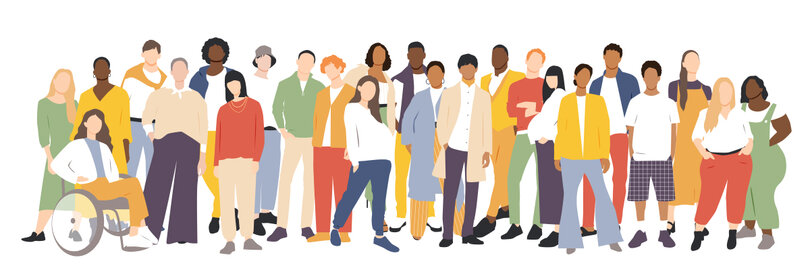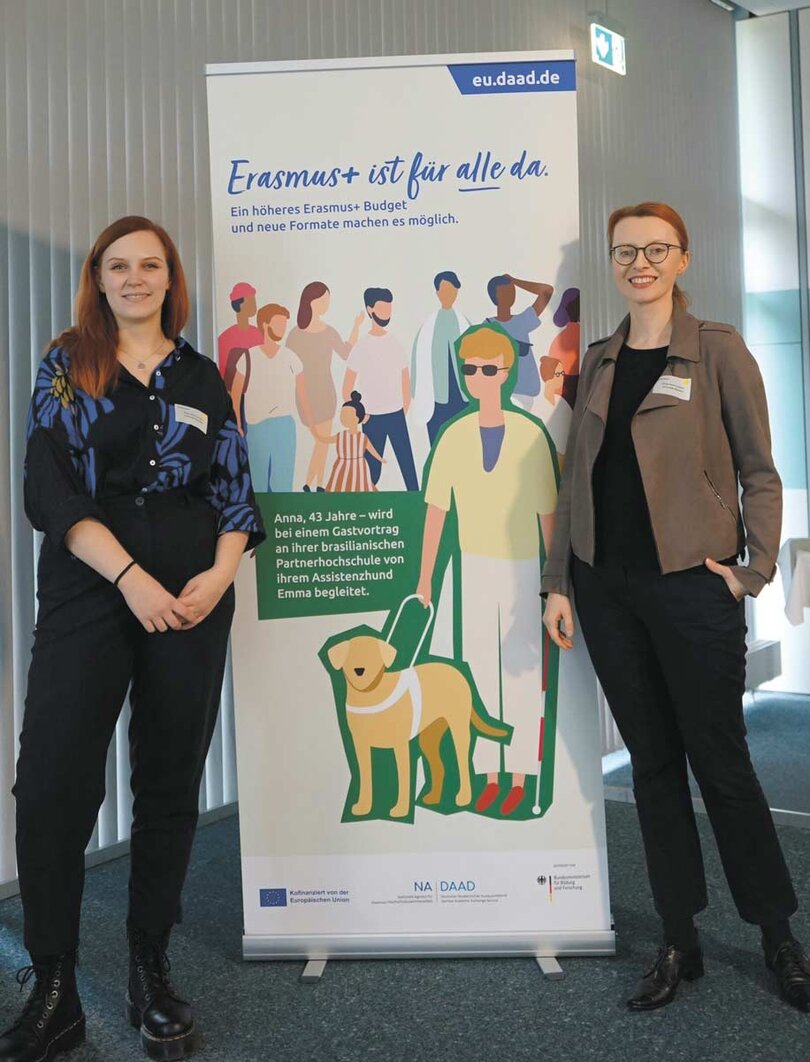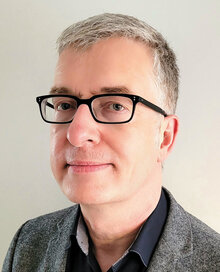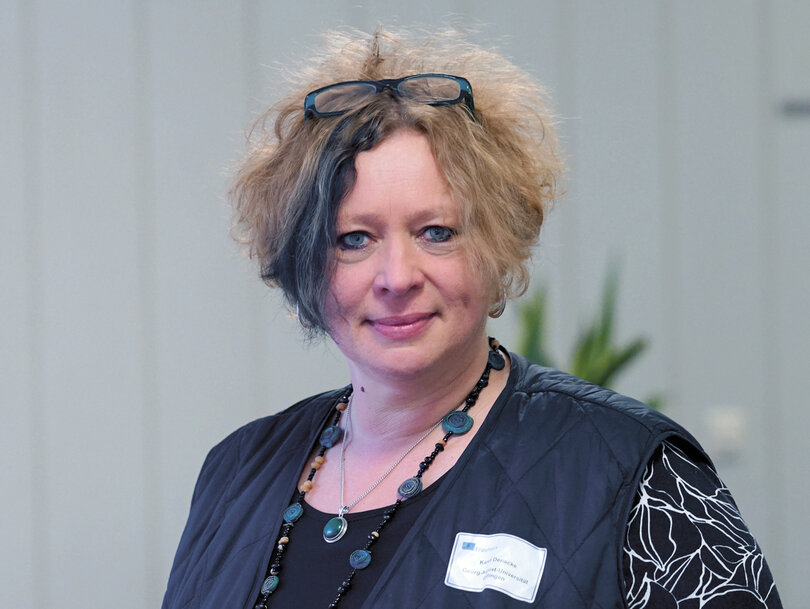Video zur Veranstaltung „Mobilität chancengerecht – gemeinsam Hürden überwinden und Barrieren abbauen

By Frauke Stebner

The discrepancy between the total number of funded participants receiving financial top-ups (2,655) and the total number of funded participants assigned to specific target groups (altogether 2,335) is due to differences in the way higher education institutions report the classification of target groups. As a result, 320 mobilities with supplementary grants cannot be clearly assigned to any of the target groups defined nationally by the NA DAAD, but rather fall under the barriers as defined by the European Commission.
With the launch of the 2021–2027 programme generation, the NA DAAD expanded the group of participants with fewer opportunities who are eligible to receive a monthly top-up amount of 250 euros. Alongside students with children and those with a disability, students with a chronic illness may now also apply for additional funding. Moreover, since the winter semester 2022/2023, universities have also been able to support working students and students from non-academic families with supplementary grants in the 2021 call.
Since the projects from the 2022 calls were launched, universities have been obliged to apply the top-up amounts to all the said target groups. The relevant requirements for participants with fewer opportunities are summarised in a catalogue of criteria for additional financial support, which is available in the NA DAAD download centre.
In the 2021–2023 funding round of the current programme phase, the expansion of target groups resulted in an enormous increase in the support of participants with fewer opportunities. For instance, the percentage of students receiving monthly top-ups rose from well below 1% in the previous programme cycle to 8.6% (2,655 recipients) in projects from the 2021 call.
Students with a disability or chronic illness accounted for 16% of those receiving additional funding (425 recipients), and 1.9% (51 recipients) were students undertaking an Erasmus mobility with a child. Moreover, 1,600 students from non-academic backgrounds (60.3% of the total additional funding) and 259 working students (9.8 per cent) were supported with supplementary grants.
Funding figures for the latter two groups are particularly noteworthy since universities were able to decide themselves whether to fund these groups in the 2021 call. Implementation has been mandatory since the 2022 calls, which means we can anticipate an even greater increase in the allocation of financial top-ups once these projects are completed.
A second step towards a more inclusive Erasmus+ programme involves intensifying communication and networking activities amongst stakeholders. This process systematically includes colleagues from all kinds of positions and roles within universities alongside students and experts, allowing for a wide range of experiences and different perspectives to be drawn upon.
In March 2024, around 80 university employees, students and colleagues from the National Agency met to discuss existing obstacles to mobilities under the motto «Equal Mobility Opportunities in Erasmus+ − Overcoming Hurdles and Removing Barriers» and to develop specific strategies to eliminate them. Then in April, an online training series titled «Diversity in Dialogue» was launched, offering members of universities and NA DAAD employees 6 training and networking sessions spread over the course of the year, which they can easily integrate into their daily work routines.
At the universities themselves, inclusion can be addressed in very different areas and in diverse ways in the context of Erasmus+. Bielefeld University and the University of Göttingen are prime examples of how inclusion initiatives can be implemented.
Frauke Stebner/NA DAAD

By Kinga Golus

Dr Kinga Golus (r), Erasmus+ expert and department coordinator at Bielefeld University’s Department of Philosophy, with philosophy student Sarah Heide (l)
In Bielefeld University’s Department of Philosophy, lecturers have been exploring the topic of inclusion and diversity from an academic perspective for a number of years. In seminars, for example, students discuss ethical questions relating to the connection between human dignity and disability or a fulfilling life with (physical) limitations.
In recent semesters, the academic perspective has been joined by a didactic approach to inclusion in teacher training. The focus is essentially on the two key questions: how inclusion can be included as a subject in philosophy teaching and how inclusive philosophy teaching can be realised both conceptually and in practice. Additionally, new initiatives aim to support students, especially first-generation students starting their degrees, navigate the university system with all its formal and informal rules, so as to improve their chances of academic success.
The new Erasmus+ programme generation complements these different activities in Bielefeld’s Department of Philosophy by introducing an extra level of awareness-raising about inclusion. Essentially, the aim is to improve awareness at leadership level, especially by training staff, such as Erasmus+ coordinators, but also by identifying training formats with appropriate content and methodology.
One such format is a 15-month training programme titled «The Inclusion ACAdemy», which was offered by the Academic Cooperation Association in collaboration with the NA DAAD and other national agencies from January 2023 to May 2024. The programme featured both online and in-person sessions. Participants, primarily International Office employees and Erasmus+ coordinators, took part online from Austria, Croatia, Finland, Iceland, Slovenia and Germany. At a final in-person conference, they discussed issues relating to counselling on «inclusion, diversity and internationalisation».
Alongside long-term programmes, the NA DAAD regularly offers training courses, such as the Training and Cooperation Activity (TCA) «Moving closer to inclusive internationalisation in Higher Education» in Berlin in November 2023 and «Equitable mobility – overcoming hurdles and breaking down barriers together» in Bonn in March 2024. Providing resources for such training courses and therefore making it possible to develop in-depth expertise in inclusion, diversity and internationalisation is a gradual process. Both awareness and commitment are needed at the leadership level to integrate inclusion into departmental practices from multiple perspectives. The Department of Philosophy is committed to achieving this goal in the long term.
«At the Department of Philosophy, we take inclusion very seriously – as an area of philosophical research, as skills we need to impart to our students and, not least of all, as an aspect of our own practices in academic teaching and organisation.»

Professor Dr. Christian Nimtz
By Karen Denecke

Karen Denecke
Erasmus+ Project Coordinator KA 131 at the University of Göttingen
Once we identified which target groups were among the participants with fewer opportunities, we realised we needed to rethink and adapt our processes and calculation methods. To be clear, the pandemic has left its mark. The digitalisation of Erasmus+ has taken its toll and the introduction of the new programme generation has also presented challenges.
Now we were facing the next challenge. Not all the measures we have implemented so far are permanent. After each application phase or project completion, we discover areas where there is still room for improvement, such as in communication, administration or technical application (for example accessibility).
Following the 2021 and 2022 projects, we can now use the 2023 projects to gather more data and assess findings more effectively. Our university still had funds from the 2021 project, so from the winter semester 2022/2023, we took advantage of the opportunity to support working students and students from non-academic backgrounds with top-up grants. To maximise the uptake of funds, we decided to support students wishing to spend this semester in countries which then belonged to country group 3, as well as students planning to complete an internship during the remaining project period, provided they met the project’s eligibility criteria.
In total, in the 2021 project, top-up amounts were awarded to 38 of 301 individuals, including 34 first-generation academics, 3 working students and 1 person with a disability. In the 2022 project, which has so far supported 511 individuals (as of 27 May 2024), 146 students (125 first-generation academics, 13 working students and 8 students with disabilities, including 1 real cost application) received additional funding.
As of 27 May 2024, our 2023 project currently funds 365 individuals, with 103 students receiving top-up amounts. Once again, first-generation academics make up the larger cohort. However, this is not the final figure since the project will continue until July 2025. Due to ongoing applications for internships and blended short-term mobilities, further increases are still possible.
We organise the Erasmus+ application procedure in the International Office through a mobility portal. In our online application forms, applicants (students and staff) can indicate whether they feel they belong to one of the target groups (information is provided in a text field). Details are not yet required at this stage of the application. First of all, we want to be able to make an initial assessment, specifically with regard to applications in the area of «Student mobilities for studies».
After the selection process is completed (by the end of April), all nominated students receive an automated email informing them that they can formally apply for the top-up amount by the given deadline (usually 14 days). To ensure equal opportunities, it is important that we actually reach all the students who belong to one of the target groups.
In the application form, providing certain information is intentionally not mandatory at this stage. Some individuals may need more time to complete the form due to very personal reasons, and some might first need to seek advice on issues such as proof of status, implications for BAföG [federal student grants], varying monthly earnings and other factors). Additionally, it is possible that the applicant’s situation at the time of application was completely different and that assignment to one of the target groups only became clear during the nomination process.
In this respect, I am very grateful for the team’s willingness to continue to analyse the process so that we reach our target groups in the best possible way. I would also like to take this opportunity to thank the NA DAAD for its tireless commitment to actively helping the universities implement the programme.
Personal feedback and individual reports consistently confirm our impression that students value the financial support provided by the programme. Some time ago, I mentioned the new top-up amounts when I was talking to friends about the Erasmus+ programme. One of the questions they asked was how we ensure no one abuses the system. My response was that we trust our students. Moreover, they know that the programme requires random checks. There have been no complaints so far.
We and the coordinators in the departments are not always able to reach the target groups (directly). This is why it is crucial we bring on board potential multipliers within the universities, such as representatives of students with impairments or severe disabilities, family services or other student delegates, and that we inform them about the opportunities the programme offers.
For me personally, prioritising inclusion and diversity has made me more aware of the need to listen and look more closely and to identify obstacles I hadn’t previously noticed or perhaps perceived as such.